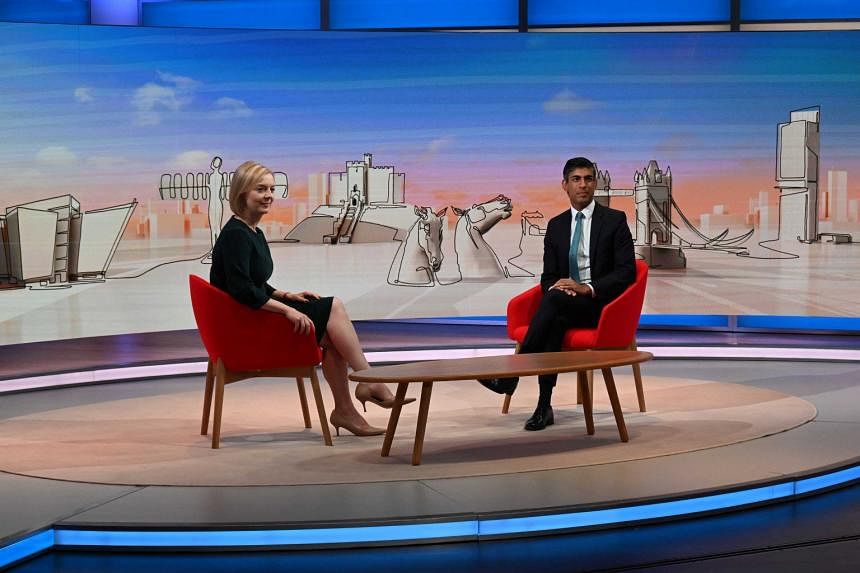LONDON - When he resigned as British Prime Minister, Mr Boris Johnson sought to reassure the country that its "brilliant and Darwinian system" could be trusted to select his successor.
Filling the post falls to his Conservative Party, since traditionally the head of the biggest party in Parliament also holds the top job in government.
A crowded field of candidates competed for support and underwent successive selection rounds involving fellow-Tory lawmakers and finally rank-and-file party members.
The list has since been whittled down to Foreign Minister Liz Truss and former finance minister Rishi Sunak. The winner of the race will be announced on Monday at 1130 GMT (7.30pm Singapore time).
1. How does the selection system work?
The procedure is governed by a group of Conservative members of Parliament, or MPs, known as the 1922 committee. The name is a reference to a general election a century ago, which was won by the Conservatives after the collapse of a coalition government.
Tory MPs put themselves forward as candidates and form campaign teams to seek the backing of the party's lawmakers. The field is whittled down in a series of ballots until only two remain, at which point their names are sent to grassroots Tory members across the country for a vote on the final choice.
The opposition Labour party has a different system for choosing its leader, with the winner selected by party members and trade union supporters.
2. How long does it take?
About eight weeks. The Conservatives wanted this contest to be as speedy as possible and managed to reduce the number of candidates to two before Parliament's summer recess starting on July 21.
The first ballot of Conservative MPs was held on July 13 and the party's new leader, and therefore the UK's next prime minister, will be announced on Sept 5.
Mr Johnson, who is known for his rhetorical flourishes, compared the political process to the evolutionary system for species outlined by British naturalist Charles Darwin.
3. Who picks the winner?
The job falls to about 175,000 grassroots Tory party members. That is actually more than when Mr Johnson himself won the leadership contest in 2019, but far short of the 47.6 million adults eligible to vote in a general election.
According to the latest data for 2020 compiled by the Queen Mary University of London and the Sussex University Party Members Project, 63 per cent of Conservative Party grassroots are male. On average they are in their late 50s - but four in ten are over 65, with only 6 per cent aged 18-24. They tend to be better off, with eight of 10 saying they are in the three highest economic and social groups by wealth and education.
Meanwhile, over nine in 10 identify as white British, and nearly half of them live in southern England.
4. Who is running the country in the meantime?
Mr Johnson remains in charge until a new leader is in place, as his predecessor Theresa May did.
Labour wanted him out sooner and pushed for a parliamentary vote of no confidence to try to bring down Mr Johnson's caretaker administration and trigger national elections. Mr Johnson survived the vote with the support from his own MPs.
5. Why won't voters get to choose the next leader?
Conservative lawmakers want to avoid elections - at least right now - as their party has been trailing Labour in the polls.
The next national vote is not due until January 2025, though it could be held earlier. The Tories currently hold 358 seats out of the total 650, giving them a 66-seat simple majority and a slightly larger working margin because there are some non-voting MPs.
Generally the ruling party is the one with the most seats in Parliament, although minority governments and coalitions are possible.
6. What are the prospects for the new leader?
Whoever replaces Mr Johnson will inherit an economy buffeted by a cost-of-living crisis with inflation running at the fastest pace in four decades, and unrest among trade unions.
The new leader will also have to repair a fractured party that has had 12 years in power and suffered as Mr Johnson's administration lurched from one crisis to another. And he or she will have to mend relations with the European Union that have been strained by Mr Johnson's threats to renege on the Brexit agreement he negotiated.
Pressure was building on Mr Johnson for months after a series of scandals, including the so-called "Partygate" events during the pandemic, for which the 58-year-old leader became the first premier found to have broken the law while in the top job. BLOOMBERG, AFP

